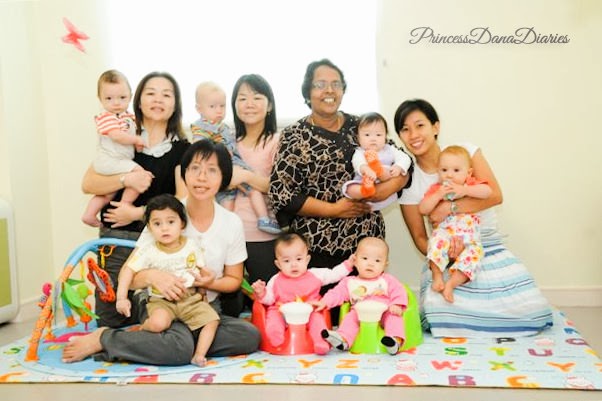Teachers play an important role in fostering the intellectual and social development of children during their formative years. Whether in nursery, kindergarten up to primary and secondary school, teachers play an integral part in developing our young into responsible adults. In fact, the younger the children, the greater influence the teachers have. They are shaping the minds of young children during their most impressionable years. We are very blessed to have met many dedicated teachers in Dana’s life who constantly gave us the assurance that she is in good hands.
 |
| Dana and her infant care teachers |
We witnessed how our girl blossoms in wisdom and stature under the many wonderful teachers she’s met in different preschool settings: Little Skool-House Infant Care (a NTUC First Campus subsidiary), Preschool By The Park (an independent full day childcare) and now, SJCK, a church-based kindergarten. We decided to hear from Dana what, in her opinion, makes a good teacher. She gave these candid responses which we summarised into ‘5 Cs’ below.
1. Child-centric
A good preschool teacher is child-centric rather than curriculum-centric. She notices and values the child. She makes mental notes about each child’s individual development and adapts activities to fit the child’s specific needs. She takes time to understand each aspect of a child’s development: cognitive development, social and emotional development, language and communication development, and psycho-motor skills development. A child-centric teacher takes time to listen to the child and honor each child as a unique person worthy of respect, listening and responding to questions and concerns. She understands that not every child learns quickly and exercises large doses of patience. She is happy to answer the same ‘why’ questions for the 100th time and because she is sincere and enthusiastic – every child feels secured and welcomed the minute they step into her classroom.
2. Compassionate
Handling a class of active preschoolers is a challenge not for the weak-willed nor faint-hearted. Young children learn compassion, graciousness, resilience and many other values by observing how their teachers communicate, react and resolve dilemmas and conflicts. Good preschool teachers go an extra mile to demonstrate their care and concern for the children and seizes teachable moments to impart these character values. When Dana was recuperating at home from her fractured toe last year, she was so happy to receive a call from her form teachers and a get-well card from her classmates. A phone call and a handmade card are simple but loving gestures that boost the child’s self-esteem. Every morning, the way the teacher greets and welcomes the children sets a positive atmosphere for learning and play.
3. Communicative
Teachers communicate with many people throughout the day: parents, children, support staff, the general public, and administrators but a good preschool teacher makes the extra effort to update the parents regularly about the child’s progress. Parents appreciate teachers who take initiative to keep communication channels open. These can take the form of emails from schools – what matters to the school matters to us too, be it reminders of the upcoming class excursion, a change in the school calendar of events and selection of holiday programmes being offered. We welcome honest observations and feedback about our child so that we can fill the gaps at home. Apart from the once-a-semester parent teacher interaction meetings, some preschools adopt a ‘communication journal’ which is helpful too. We like it that Dana’s kindergarten principal personally replies to our emails promptly. It gives us faith that the school values its partnership with parents.
4. Creative
Life is very active for a preschooler. A young child learns concepts predominantly through play and hands-on, real-life experiences. Therefore a great preschool teacher understands the various means by which young children learn, and plans lessons, which engage children on multiple levels. She uses her creativity to set up a rich, inviting, fun environment that provides each child the opportunity to learn and grow. Her classroom is filled with toys and manipulatives, which complement the mastery of language, math, science, social skills, fine and gross motor skills, and problem solving skills. She has a variety of teaching resources at her fingertips and is able to exercise flexibility to make learning fun and holistic for children of different learning styles.
5. Calm
There are certain days when even the most well-planned lessons may not turn out the way it’s supposed to be. Contingencies happen and your best plans are waylaid. Kids misbehave and are uncooperative; parents make unreasonable demands and your best intentions are misconstrued. A good and experienced preschool teacher handles each of these challenges calmly and confidently. She takes criticisms and feedback in her stride and actively develops herself professionally. She reassures parents that the child’s welfare is the priority in all she does. She leads by example in her daily interactions, showing the children that she is not easily frustrated, angered or exasperated. The children under her care grow up well-adjusted, happy and confident.
It is a tall order to be a good preschool teacher but reality is, there are many of such selfless, committed teachers with these 5 ‘C’s around us. Day after day, we entrust our children to them for that few hours and ‘magic’ happens. Even as the school year draws to a close, let’s remember to applaud these teachers with a big, heartfelt ‘thank you’.
 |
| Dana’s Infant Care at Little Skool House – one of the best choices we’ve made. |
 |
| Celebrating her 1st birthday with her infant-care teachers and friends |
NTUC First Campus specially commissioned this heartwarming video as a tribute to all the teachers in their midst.


Leave a Reply